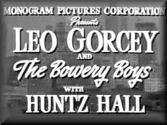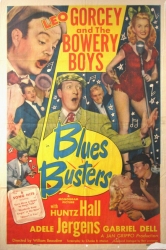1946
Live Wires In Fast Company Bowery Bombshell Spook Busters Mr. HexLIVE WIRES
(1946)The Boys: Leo Gorcey ("Slip"), Huntz Hall ("Sach"), Bobby Jordan ("Bobby"'), William "Billy" Benedict ("Whitey"), William Frambes (the short-lived "Homer")
With Mike Mazurki, Claudia Drake, Pamela Blake, John Eldridge, Patti Brill, Bernard Gorcey
Directed by Phil Karlson
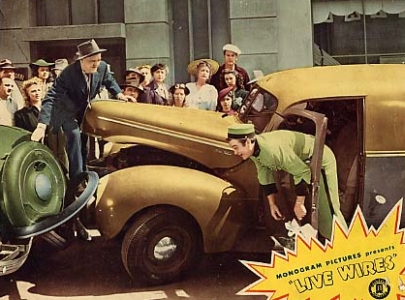 In Live Wires, the first of 48 Bowery Boys films, Slip (Leo Gorcey) loses
several jobs because of his temper, as his supportive
sister grows increasingly exasperated at his inability to keep
a
position. The concept of a Bowery
Boy with an actual life outside of the gang would soon shift to the
opposite direction, in which it will seem they have no life
whatsoever outside of hanging out with each other.
In Live Wires, the first of 48 Bowery Boys films, Slip (Leo Gorcey) loses
several jobs because of his temper, as his supportive
sister grows increasingly exasperated at his inability to keep
a
position. The concept of a Bowery
Boy with an actual life outside of the gang would soon shift to the
opposite direction, in which it will seem they have no life
whatsoever outside of hanging out with each other.
The highlight of Live Wires is a long and funny scene in which Slip and Sach (Huntz Hall), now process servers, wind up in the company of a playful homicidal maniac, played by the hulking character actor Mike Mazurki. An interesting bit of casting comes when Bernard Gorcey shows up not as Louie Dumbrowski, Sweet Shop Entrepreneur, but rather as a local lowlife gangster that Slip pumps for info.
NOTE: In the cast section at the beginning of each film, I choose to list the individual Bowery Boys first and then the more important supporting cast members. Regarding Gabe Dell and Bernard Gorcey, while they were technically not part of the actual gang that hung out together (Slip, Sach, Bobby, Whitey, Chuck), they were both integral to the films, and I feel that out of respect for what they brought to the table, they deserve to be counted as "Bowery Boys". Only when they play a part other than "Gabe" and "Louie" respectively do I list them as supporting cast members.
SCHTICK 'EM UP
"After a few days of selling this stuff, our families will see us as we
really are."
"Certainly --- on visitor's days."
IN FAST COMPANY
(1946)The Boys: Leo Gorcey ("Slip"), Huntz Hall ("Sach"), Bobby Jordan ("Bobby"'), William "Billy" Benedict ("Whitey"), David Gorcey ("Chuck"), Bernard Gorcey ("Louie Dumbrowski")
With Paul Harvey, Jane Randolph, Judy Clark, Douglas Fowley, Marjorie Woodworth, Charles D. Brown
Directed by Del Lord
In Fast Company sometimes feels like one of those social-melodramas Warners did so well. When a taxi driver friend is unable to work because of an "accident" caused by the head of a powerful rival cab company, Slip takes over the job to keep his friend afloat and comes under similar attack. James Cagney was doing similar stuff fourteen years earlier in Taxi! (The exclamation point is part of the original title, not a gesture of surprise from me).
More notable than the plot is the first appearance of Louie Dumbrowski, owner of the sweet shop which will serve as the boys' headquarters for most of the series. Louis is played by Leo Gorcey's father Bernard, and is one of the most well-loved characters in the series. He's a sweet old guy who loves the boys, gets exasperated with them easily (they never, ever pay a bill) but misses them something awful when they're not around. Whenever the boys go out on some adventure somewhere, you can make book that Louie will join them again halfway through the film.
The film benefits from several decent comedy scenes, including one set in the Sweet Shop where six people wind up crowded in a phone booth, a small scale version of the stateroom scene in The Marx Brothers' A Night at the Opera. There is also a great bit by Leo Gorcey, who, as Slip, acts out for the gang his interrogation of a cab company's owner, a scene in which Gorcey does a dead-on imitation not of Paul Harvey who plays the owner, but of Lionel Barrymore!
Another Gorcey, Leo's brother David, make his Bowery Boys debut in In Fast Company. David Gorcey was a Little Tough Guy and an East Side Kid, but this is the beginning of a 12-year Bowery Boys career for him that consisted of being paid by his brother to do next to nothing. Nice work if you can get it.
BOWERY BOMBSHELL
(1946)The Boys: Leo Gorcey ("Slip"), Huntz Hall ("Sach"), Bobby Jordan ("Bobby"'), William "Billy" Benedict ("Whitey"), David Gorcey ("Chuck"), Bernard Gorcey ("Louie Dumbrowski")
With Sheldon Leonard, Tea Loring, Dawn Kennedy, William "Wee Willie" Davis, James Burke
Directed by Phil Karlson
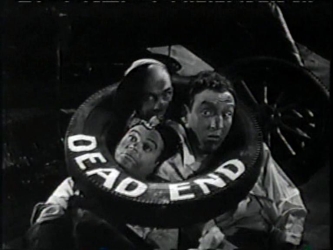 Bowery Bombshell is
a film that clearly shows how far the gang could go on sheer
personality. Director Phil Karlson ruins a surefire tried and
true
comedy bit - Slip tries to
sell his wreck of a car but Bobby and Sach ruin the sale by
accidentally breaking off a
loose fender and door - by framing it poorly, losing the humor by
hardly
including the fender and door in the shot at all. Later, he
also
muffs what
could have been the funniest gag in the film - at the entrance of a
notorious gangster (actually Slip in disguise), an entire swing
orchestra walks off the bandstand mid-song and heads out the
door of
the nightclub. It's a great idea, but it is given no emphasis
at
all and so barely registers. Yet, in spite
of unsympathetic direction, Bowery
Bombshell remains entertaining. Why?
Bowery Bombshell is
a film that clearly shows how far the gang could go on sheer
personality. Director Phil Karlson ruins a surefire tried and
true
comedy bit - Slip tries to
sell his wreck of a car but Bobby and Sach ruin the sale by
accidentally breaking off a
loose fender and door - by framing it poorly, losing the humor by
hardly
including the fender and door in the shot at all. Later, he
also
muffs what
could have been the funniest gag in the film - at the entrance of a
notorious gangster (actually Slip in disguise), an entire swing
orchestra walks off the bandstand mid-song and heads out the
door of
the nightclub. It's a great idea, but it is given no emphasis
at
all and so barely registers. Yet, in spite
of unsympathetic direction, Bowery
Bombshell remains entertaining. Why?
The Bowery Boys didn't have the luxury
of top-notch
gag writers or a sack load of tried and true burlesque routines to
fall back on like other screen teams. What they had was
personality. Audiences had
liked these guys since 1937's Dead End,
and
continued to like them in each and every film incarnation ever since
then. Once in a while, they had a
good comedy director (Edward Bernds, for
example) or a
story so silly it practically carried itself (Blues
Busters, Bowery to Bagdad) but
overall, The Bowery Boys used their own screen personalities
to
keep films moving along. They chattered, they ad-libbed, they
fought, they felt like a gang of overgrown kids who really liked each
other. They had heart, especially in these early films, and
audiences responded to that heart back then, and still can today.
Oh, and the plot: Sach is suspected of robbing a bank, and the gang must clear his name by tracking down the real robbers. Oh, and there's a scientist who has invented a new kind of explosive. This comes in handy when the writers need to wrap up the film. The ending gag, pictured above, is a neat little tribute to the Boys' past.
SCHTICK 'EM UP
"You haven't got the brains of a moron!"
"Yes I have!"
OH, CHIEF!
I know it's a Bowery Boys film, knocked off in just a couple of days, but if Sach's picture is on the front page of every newspaper, fingered as a bank robber, what the hell are the gang thinking by letting him walk around on the street in broad daylight?
SPOOK BUSTERS
(1946)The Boys: Leo Gorcey ("Slip"), Huntz Hall ("Sach"), Bobby Jordan ("Bobby"'), William "Billy" Benedict ("Whitey"), David Gorcey ("Chuck"), Gabriel Dell ("Gabe"), Bernard Gorcey ("Louie Dumbrowski")
With Douglass Dumbrille, Charles Middleton, Tanis Chandler, Vera Lewis
Directed by William Beaudine
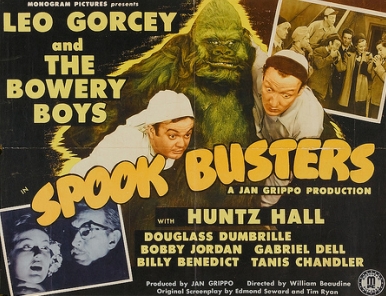 Not to be confused
with the later Ghost Chasers
or Spook Chasers, or the 1980s Ghostbusters comedies for that
matter.
Not to be confused
with the later Ghost Chasers
or Spook Chasers, or the 1980s Ghostbusters comedies for that
matter.
At last, the Bowery Boys make a pure comedy. There is more comedy schtick in this one haunted house adventure than you'll find in the three previous films combined. From Slip's opening narration about "granulating" from exterminating school ("I was stirred up with commotion, and there was a big lunk in my throat...") to a final underground chase featuring (what else) a gorilla, there's hardly a serious moment to be found in Spook Busters. Huntz Hall even does a few moments of an old burlesque routine (we'll call it "Charlie's Got a Knife"), concerning an imaginary killer, that Abbott and Costello did many times. The difference is that Abbott and Costello always made a full, perfectly-timed and executed scene out of this material, while, in the "throw any gags out there and let's see what sticks" world of Bowery Boys comedy writers, this classic routine becomes just another throwaway gag.
The horror-comedy genre was nothing new, of course. Buster Keaton, Laurel and Hardy, Abbott and Costello and The Three Stooges, among others, had all mined this particular genre with varying results, with Abbott and Costello's Hold That Ghost being my favorite of this particular cinema sub-category. As the East Side Kids, the boys twice tangled with the great Bela Lugosi in the films Spooks Run Wild and Ghosts on the Loose. Spook Chasers has all the clichés of the genre - rotating walls, disappearing objects, secret passageways, and, of course, a sinister group of people manipulating mechanical "ghostly" devices in an effort to scare people away so they can carry out their nefarious deeds in secret. Enter the Bowery Boys, as recent graduates of Exterminating School, called upon by a real estate agent to rid an old weird house of all pests, and you've got the setup for a typical example of a '40s horror comedy.
The cast includes two great bad guys of the screen. Douglass Dumbrille, best known for his turn as the wannabe racetrack owner in The Marx Brothers A Day at the Races, plays the mad scientist who, like so many B-movie mad scientists, wants to put the brain of a human into the body of a gorilla? Why? I'm guessing it had to be done once in every mad scientist's career just to stay in the union. The cadaverous Charles Middleton plays his ghoulish assistant ("This guy brings his own undertakers!" says Slip about Dumbrille when Middleton walks into the room). Also in the cast is Vera Lewis, a screen veteran who had appeared in dozens of films (often uncredited) including Intolerance, All This, And Heaven Too and Yankee Doodle Dandy, but is probably best known to comedy fans as the reprehensible Mrs. Nesselrode, W. C. Fields' mother-in-law in the classic The Man on the Flying Trapeze.
Gabriel Dell makes a welcome return to the gang, having been both a Dead End Kid and an East Side Kid. One of the better actors of this group, Dell arrives about fifteen minutes into the film with his new wife, who can only speak French, until the screenwriters give up on that idea halfway through the film and decide she can speak English too. What she brings to the film aside from the opportunity for a few French jokes, I don't know.
The Bowery Boys would never make a comedy masterpiece like City Lights, Sherlock Jr., It's a Gift, Way Out West or Duck Soup. But this was 1946 and the Golden Age of movie comedy was over. The Marx Brothers had just come out of self-imposed retirement for the slight but occasionally amusing A Night in Casablanca, Laurel and Hardy were virtually finished in movies, and W. C. Fields would be dead by the end of the year. In their place now were a new breed of fast-talking, wise-cracking comics like Abbott and Costello and Bob Hope. With that competition, the Bowery Boys held their own in a small little corner of the film comedy world. Spook Busters may not be a comedy for the ages, but it is certainly more fun than some of the later films of The Marx Brothers and Laurel and Hardy. It's certainly a more entertaining film than, say, The Big Store or A-Haunting We Will Go, and by a pretty wide margin too.
SCHTICK 'EM UP
"This house is in the state of unoccupancy."
"I thought it was in the State of New York."
DON'T SHOOT ME, I'M ONLY THE GORILLA
Spook Busters breaks what, to me, is a cardinal rule of slapstick comedies: never kill the gorilla. If you are going to use a gorilla in a comedy, he should triumph at the end, as in Laurel and Hardy's Swiss Miss, when he makes a surprise reappearance after Stan and Ollie believe he plummeted to his death. In The Marx Brothers At The Circus, the gorilla - or is it an orangutan? - gets the final gag of the film. In Spook Busters film, after being cooped up in a cage for most of the picture, the gorilla escapes and is shot to death by Douglass Dumbrille and the cops. It might be a little thing, but it just spoils the final moments of the film for me.
MR. HEX
(1946)The Boys: Leo Gorcey ("Slip"), Huntz Hall ("Sach"), Bobby Jordan ("Bobby"'), William "Billy" Benedict ("Whitey"), David Gorcey ("Chuck"), Gabriel Dell ("Gabe"), Bernard Gorcey ("Louie Dumbrowski")
With Gale Robbins, Ben Welden, Ian Keith, Sammy Cohen
Directed by William Beaudine
The plot has Sach hypnotized into thinking he is a great boxer, but when he works his way to the championship bout, gangsters attempt to get him off his game by employing Evil-Eye Fagin, whose bugged-out eyes throw the whammy on whoever looks at him. Evil-Eye is played by actor Sammy Cohen, who really could bug out his eyes and must be seen to be believed.
That's about all I can say about MR. HEX because unfortunately the print shown on Turner Classic was virtually unwatchable from the middle of the film to the end. I don't think I have ever seen a worse print broadcast on television in my life, and I spent half my childhood watching bad prints of movies on local TV. At least half of Mr. Hex is out of focus, as if somebody made a copy of it with a camera with a broken lens. If I come across a better print, I will review the film, but right now I cannot do a fair and accurate job of it.
Mr.
Hex could be classified as the first of
several Bowery Boys film in which Sach acquires a special power, this
time through hypnotism. Usually he acquires these powers
through
less conventional means, such as a hit on the head (No Holds Barred) or
a new medicine (Jungle Gents).
It's usually a surefire plot
device, making for some of the boys' best comedies.

